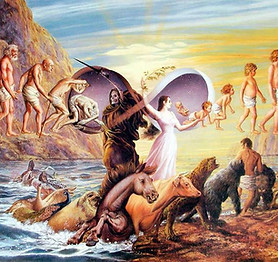The Hindu World
Course Page

"Hinduism is a wonderful religion, totally confusing, neither this nor that, profound and profane, beautiful and tawdry, tolerant and bigoted, silent and cacophonous, gratuitous and commercialized, worshiping the One unknowable Absolute under three hundred million manifestations."
~ Alakananda Ma (from Pilgrimage to the Mother,
A Woman's Journey to the Source of the Ganges

A required course for the Certificate in Hindu Studies and Diploma in Applied Theology programs.
This 8 week course provides an overview pf foundational aspects of Hindu thought and practice.
Our approach to the subjects of this course is traditional, yet informed by contemporary scholarship and responsive to modern challenges. At Ramakrishna Seminary our focus is on the practical applications of religious thought and philosophy to the active spiritual lives of our students. Emphasis is given to personal spiritual development, cultural authenticity and service of God in the world.
Class Structure
This course consists of eight modules, one module per week. Materials for this course will be a combination of original content (live webinars, recordings and writings by the instructor) and curated content (PDFs of articles, essays and selections from books and journals, readings from textbooks, and links to online videos and articles).
Each Saturday students will gain access to the new module’s study material. This will include a 90+ minute video-lectures by Swami Bhajanananda, per-recorded at the ashram dhuni (fire altar), as well as supplementary reading from saints and scholars, Sanskrit verses to learn, visual aids and graphics, and other study material.
Every Thursday evening from 7pm – 8:30pm (Pacific) there will be a live Zoom meeting for questions and discussion with the instructor and fellow students. Recordings of these Zoom meetings will be posted within a few hours of the live meetings for those who could not attend the live broadcast. See Course Calendar>>
Students will have access to dedicated Google Classroom course page (for announcements, handouts, study questions, discussions with fellow students and faculty, and turning in assignments), as well a student group page, and online office hours with the instructor.
(Students will continues to be able to access and review all course material, including lectures, readings, and Zoom recordings, for twelve months after the end of the course.)
Class Size
To preserve the atmosphere of a gurukulam, we aim to keep classes small, personal, and intimate.
Tuition
Tuition for this course is $350.
Students requesting financial assistance may be considered for discounted tuition or a full scholarship, supported by donations from fellow students and seminary patrons. If you are able, please consider contributing to the RKS Scholarship Fund so that no sincere student is denied spiritual education due to limited finances.
Registration
If you are an enrolled RKS student and wish to register for this course, please email the Registrar at RamakrishnaSeminary@KaliMandir.org and they will contact you with details on tuition and accessing class-meetings and material. If you have not yet been admitted as an RKS student, please fill out the application form to begin the process.
_____________________
By participating in any program or course given by Ramakrishna Seminary, students consent to our Terms and Conditions Agreement.
Rev. Dr. Swami Bhajanananda Saraswati is a Hindu monk, priest, educator, and Dean of the Seminary with more than thirty years of experience in presenting the teachings and practices of Sanatana Dharma, Indian philosophy, Tantric rituals, and the Hindu devotional schools.


Suggested Textbook
Hinduism, A Very Short Introduction
Kim Knott, Oxford University Press, 2000
"This book is instantly accessible in its approach without being in any way condescending or an oversimplification. Each of the chapters tackles a crucial issue or web of interconnected issues, none of them straightforward and yet all conveyed with an elegance and simplicity that belies their inherent complexity."
Course Reader
The instructor has created a 320-page spiral-bound Course Reader containing the course’s supplementary readings. This Course Reader is optional, as all materials will also be accessible and downloadable on the module pages. The reader is available for a donation of $40, to help cover the cost of printing and shiping.
Accessing Course Modules
Click on the module links below to access recordings of class-lectures, online meetings, supportive materials, and assignments
(Access restricted to registered students)
Copyright Disclaimer Under Section 107 0f Copyright Act in 1976, allowance is made for “Fair Use” for purposes such as criticism, comment, news reporting, teaching, scholarship, and research. Fair use is a use permitted by copyright statute that might otherwise be infringing. Non-profit educational or personal use tips the balance in favor of fair use. All rights and credit go directly to its rightful owners. No copyright infringement intended. Fair Use Definition: Fair use is a doctrine in United States copyright law that allows limited use of copyrighted material without requiring permission from the rights holders, such as commentary, criticism, news reporting, research or scholarship. It provides for the legal, non-licensed citations or incorporation of copyrighted material in anther author’s world under a four-factor balancing test. All opinions expressed are those of the authors and not necessarily those of Kali Mandir or Ramakrishna Seminary.

To be announced
MODULE 1
SANTANA DHARMA
Hinduism and Its Self-Understanding

Restricted
Access Module 1

To be announced
MODULE 2
HINDU COSMOLOGY
Cycles Within Cycles

Restricted
Access Module 2

To be announced
MODULE 3
TEXTUAL TRADITIONS
The Scriptures and Their Commentaries

Restricted
Access Module 3

To be announced
MODULE 5
DARSHANA
Classical Schools of Indian Philosophy
Restricted
Access Module 5


To be announced
MODULE 6
WHO ARE WE? ~ Karma, Reincarnation, and our Final Destination
Restricted
Access Module 6


To be announced
MODULE 7
VARNA AND ASHRAM ~ Ancient Ideals of Dharma & Their Modern Challenges
Restricted
Access Module 7


To be announced
MODULE 8
PURUSHARTHA
The Four Goals of Human Life
Restricted
Access Module 8

Attendance/Participation 50%
Class assignments 50%
__________________________________________________________
Passing grade for Seminary Credit 70% and above
Evaluation of Student Performance
This 3-unit course is worth 3 Seminary Credits, and can be taken for either Credit or No Credit. Students not taking the course to earn Seminary Credits are not required to turn in written assignments or a final paper, but are expected to participate in online lectures and discussions and keep up with assigned readings and other materials. Students who are taking this course for Seminary Credits are expected to attend weekly online lectures and discussions. If students must miss a live lecture, they are expected to watch the recording of the session and to participate in the discussion forum.


